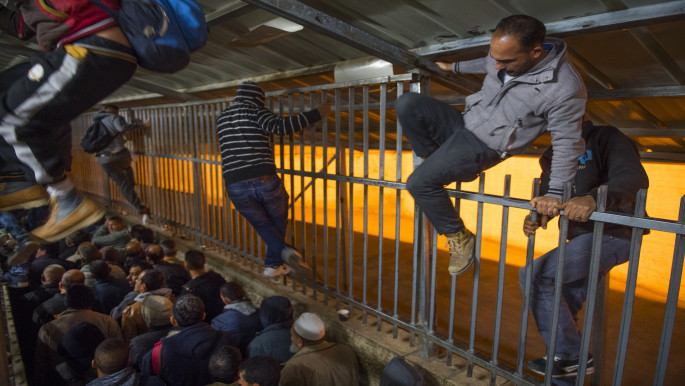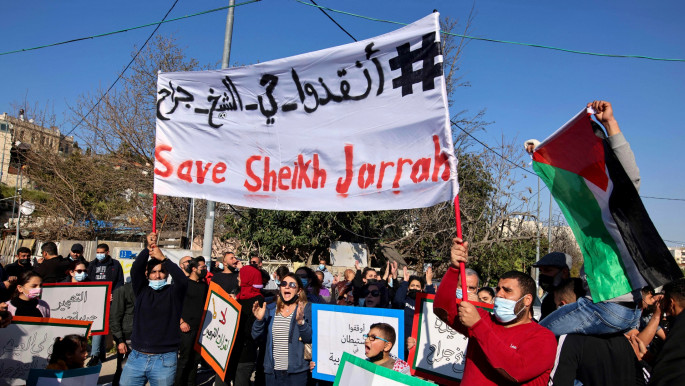Surviving to live, living to survive: The Present brutally exposes the everyday tragedies of occupation
The film follows Yusef, brilliantly interpreted by Saleh Bakri, and his daughter Yasmine, as they try to buy a new fridge for his wedding anniversary.
During their short journey from their home to the shop, they have to pass through one of the hundreds checkpoints that mark occupied Palestinian landscape, along with road barriers and gates, trenches, and roadblocks.
As soon as they leave their home in the morning, they have to queue through a crammed passage to be able to pass through a checkpoint with other Palestinians going to work, while cars passing through the gate reserved for Israelis speed on their left. The scene is particularly powerful, as it is shot in a real location without actors, capturing what is the daily reality of thousands of Palestinians living under Israeli military rule.
The day doesn't start well for Yusef and Yasmine, as they are denied passage by an Israeli soldier without reason and are told to wait in a cage for several hours as the soldiers seize Yusuf's belongings as he goes through an unjustified, lengthy and humiliating security check.
Restrictions on freedom of movement is a constant feature of Palestinians' lives in the West Bank and Gaza.
As the well-respected Israeli human rights organisation B'Tselem argues, "restricting movement is one of the main tools Israel employs to enforce its regime of occupation", as Palestinians need to obtain travel permits which are given "through a lengthy, non-transparent and arbitrary bureaucratic process".
This means that Palestinians live in a situation of "constant uncertainty", as they are unable "to perform simple tasks and plan their lives".
Towards the end of the movie, Yusef is clearly worn out by the absurd and unjust restrictions of Israeli apartheid, coupled with his chronic back pain, and is on the edge of getting into trouble, as he understandably loses his composure and confronts Israeli soldiers not allowing him to get his new fridge through a checkpoint.
 |
The arrogance and contempt of the Israeli military in the film clearly reflects a system that is based on a mindset that considers Arabs as inferior, second-class citizens |  |
Just as the situation risks escalating, with Israeli soldiers pointing their guns at Yusuf, he is saved by his daughter Yasmine, who defies the officers by passing through the Israeli-only gates, and both manage to get home in the end.
The Present shows the exhausting, strenuous facets of the occupation, beyond the more visible and known acts of violence or blatant injustices, which creep into every aspect of Palestinians' daily life.
Read more: Is Israel an apartheid state?
The most ordinary of activities, going for groceries and buying a new fridge, becomes a draining task for Yusef and his Yasmine, and what should have been a moment of carefree quality time between a father and daughter is ruined by rules of apartheid.
 |
The most ordinary of activities, going for groceries and buying a new fridge, becomes a draining task for Yusef and his Yasmine, and what should have been a moment of carefree quality time between a father and daughter is ruined by rules of apartheid |  |
 |
| Director Farah Nabulsi utilised "guerilla filmmaking" techniques to show Yusef travel through Bethlehem's infamous checkpoint, 'Checkpoint 300' [Getty Images] |
The simplicity of the plot, and the characters' ordinariness, common decency and humanity, convey the movie's message very effectively, as the viewer is able to naturally empathise and identify with Yusuf's situation, and his unfair and unjustified treatment by Israeli soldiers.
The film also starkly shows how Israeli occupation rests on the dehumanisation of Palestinians and racism.
This is visible when the Israeli soldiers tells Yusuf that "you all stink" (referring to Arabs) as he questions him, and in the way in which every Palestinians passing through the checkpoint is considered a potential threat.
Read more: How Israeli industrial zones exploit Palestinian land and labour
The comparison with South African apartheid is strikingly accurate in this respect. As B'Tselem has documented, Israel is ruling over "a regime of Jewish supremacy… advancing and cementing the supremacy of one group – Jews – over another – Palestinians".
The arrogance and contempt of the Israeli military in the film clearly reflects a system that is based on a mindset that considers Arabs as inferior, second-class citizens.
 |
| Read also: The ethnic cleasing of Palestinians in East Jerusalem |
However, the film is also punctuated by small acts of kindness and solidarity between Palestinians, showing the power of the former as agents of resilience in the face of Israeli military order: an old lady given way as she queues at the checkpoint, the cordiality of the shop owners, Yusef's tight-knit and loving family.
In the face of a much more powerful oppressor, maintaining these links of solidarity represents a crucial form of resistance for the Palestinians people, and the film illustrates well that these are still very much present, and form a web of mutual aid and support enabling Palestinians to find courage and go on with their lives with dignity, to the extent possible.
In this sense, The Present is not only a film about the corrosiveness of the occupation, but also about the power of love and solidarity against injustice.
In 25 minutes, Nabulsi's film provides an authentic glimpse into the daily life of a Palestinian family living under occupation.
Cleverly directed, starring a talented cast, and suitable for both viewers unfamiliar with the political situation in Palestine, and for a more expert audience, The Present deserves to be seen, and will not leave you indifferent.
Tommaso Segantini is a freelance writer with a background in international relations and forced migration studies. His work has appeared on Jacobin, openDemocracy, and Adbusters.




 Follow the Middle East's top stories in English at The New Arab on Google News
Follow the Middle East's top stories in English at The New Arab on Google News


